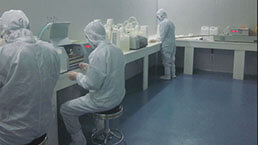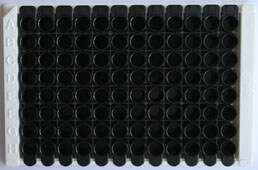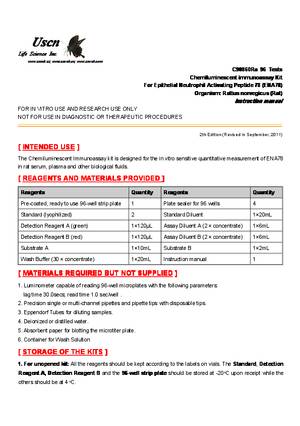Packages (Simulation)

Reagent Preparation

Image (I)
Certificate


CLIA Kit for Epithelial Neutrophil Activating Peptide 78 (ENA78)
CXCL5; SCYB5; Chemokine C-X-C-Motif Ligand 5; Small Inducible Cytokine Subfamily B(Cys-X-Cys),Member 5; Neutrophil-activating peptide ENA-78
- Product No.SCA860Ra
- Organism SpeciesRattus norvegicus (Rat) Same name, Different species.
- Sample TypeSerum, plasma and other biological fluids
- Test MethodDouble-antibody Sandwich
- Assay Length2h, 40min
- Detection Range1.37-1,000pg/mL
- SensitivityThe minimum detectable dose of this kit is typically less than 0.49pg/mL.
- DownloadInstruction Manual
- UOM 48T96T 96T*5 96T*10 96T*100
- FOB
US$ 638
US$ 912
US$ 4104
US$ 7752
US$ 63840
For more details, please contact local distributors!
Specificity
This assay has high sensitivity and excellent specificity for detection of Epithelial Neutrophil Activating Peptide 78 (ENA78).
No significant cross-reactivity or interference between Epithelial Neutrophil Activating Peptide 78 (ENA78) and analogues was observed.
Recovery
Matrices listed below were spiked with certain level of recombinant Epithelial Neutrophil Activating Peptide 78 (ENA78) and the recovery rates were calculated by comparing the measured value to the expected amount of Epithelial Neutrophil Activating Peptide 78 (ENA78) in samples.
| Matrix | Recovery range (%) | Average(%) |
| serum(n=5) | 97-104 | 101 |
| EDTA plasma(n=5) | 91-101 | 96 |
| heparin plasma(n=5) | 91-101 | 94 |
Precision
Intra-assay Precision (Precision within an assay): 3 samples with low, middle and high level Epithelial Neutrophil Activating Peptide 78 (ENA78) were tested 20 times on one plate, respectively.
Inter-assay Precision (Precision between assays): 3 samples with low, middle and high level Epithelial Neutrophil Activating Peptide 78 (ENA78) were tested on 3 different plates, 8 replicates in each plate.
CV(%) = SD/meanX100
Intra-Assay: CV<10%
Inter-Assay: CV<12%
Linearity
The linearity of the kit was assayed by testing samples spiked with appropriate concentration of Epithelial Neutrophil Activating Peptide 78 (ENA78) and their serial dilutions. The results were demonstrated by the percentage of calculated concentration to the expected.
| Sample | 1:2 | 1:4 | 1:8 | 1:16 |
| serum(n=5) | 78-97% | 78-98% | 93-105% | 89-97% |
| EDTA plasma(n=5) | 92-105% | 79-98% | 93-105% | 94-105% |
| heparin plasma(n=5) | 95-105% | 78-90% | 91-98% | 97-105% |
Stability
The stability of kit is determined by the loss rate of activity. The loss rate of this kit is less than 5% within the expiration date under appropriate storage condition.
To minimize extra influence on the performance, operation procedures and lab conditions, especially room temperature, air humidity, incubator temperature should be strictly controlled. It is also strongly suggested that the whole assay is performed by the same operator from the beginning to the end.
Reagents and materials provided
| Reagents | Quantity | Reagents | Quantity |
| Pre-coated, ready to use 96-well strip plate | 1 | Plate sealer for 96 wells | 4 |
| Standard | 2 | Standard Diluent | 1×20mL |
| Detection Reagent A | 1×120µL | Assay Diluent A | 1×12mL |
| Detection Reagent B | 1×120µL | Assay Diluent B | 1×12mL |
| Substrate A | 1×10mL | Substrate B | 1×2mL |
| Wash Buffer (30 × concentrate) | 1×20mL | Instruction manual | 1 |
Assay procedure summary
1. Prepare all reagents, samples and standards;
2. Add 100µL standard or sample to each well. Incubate 1 hours at 37°C;
3. Aspirate and add 100µL prepared Detection Reagent A. Incubate 1 hour at 37°C;
4. Aspirate and wash 3 times;
5. Add 100µL prepared Detection Reagent B. Incubate 30 minutes at 37°C;
6. Aspirate and wash 5 times;
7. Add 100µL Substrate Solution. Incubate 10 minutes at 37°C;
8. Read RLU value immediately.
GIVEAWAYS
INCREMENT SERVICES
-
 Single-component Reagents of Assay Kit
Single-component Reagents of Assay Kit
-
 Lysis Buffer Specific for ELISA / CLIA
Lysis Buffer Specific for ELISA / CLIA
-
 Quality Control of Kit
Quality Control of Kit
-
 CLIA Kit Customized Service
CLIA Kit Customized Service
-
 Disease Model Customized Service
Disease Model Customized Service
-
 Serums Customized Service
Serums Customized Service
-
 TGFB1 Activation Reagent
TGFB1 Activation Reagent
-
 Real Time PCR Experimental Service
Real Time PCR Experimental Service
-
 Streptavidin
Streptavidin
-
 Fast blue Protein Stain solution
Fast blue Protein Stain solution -
 Single-component Reagents of FLIA Kit
Single-component Reagents of FLIA Kit
-
 Streptavidin-Agarose Beads
Streptavidin-Agarose Beads
| Magazine | Citations |
| Journal of Biochemical and Molecular Toxicology | Ameliorative Effects of Curcumin on Fibrinogen-Like Protein-2 Gene Expression, Some Oxido-Inflammatory and Apoptotic Markers in a Rat Model of l-Arginine-Induced Acute Pancreatitis. Pubmed:26862043 |
| Journal of Biochemical and Molecular Toxicology | Ameliorative Effects of Curcumin on Fibrinogen-Like Protein-2 Gene Expression, Some Oxido-Inflammatory and Apoptotic Markers in a Rat Model of l-Arginine-Induced Acute Pancreatitis pubmed:26862043 |
| OncoTargets and Therapy | The clinical significance of CXCL5 in non-small cell lung cancer. pubmed:29200871 |
| Biochimie | Activated CXCL5-CXCR2 axis promotes the migration, invasion and EMT of papillary thyroid carcinoma cells via modulation of β-catenin pathway Pubmed:29471001 |
| Cancer Biology & Therapy | Activation of CXCL5-CXCR2 axis promotes proliferation and accelerates G1 to S phase transition of papillary thyroid carcinoma cells and activates JNK and p38 … Pubmed: 30404567 |
| Respiratory Research | Phospholipase Cε plays a crucial role in neutrophilic inflammation accompanying acute lung injury through augmentation of CXC chemokine production from … Pubmed: 30634975 |
| American Journal of Pathology | Interleukin17–CXCR2 axis facilitates breast cancer progression by up-regulating neutrophil recruitment Pubmed: 31654638 |
| Bioactive Materials | Secretions from hypochlorous acid-treated tumor cells delivered in a melittin hydrogel potentiate cancer immunotherapy 34820587 |
| Am J Cancer Res | Differential expression profile of CXC-receptor-2 ligands as potential biomarkers in pancreatic ductal adenocarcinoma Pubmed:35141005 |
| Catalog No. | Related products for research use of Rattus norvegicus (Rat) Organism species | Applications (RESEARCH USE ONLY!) |
| RPA860Ra01 | Recombinant Epithelial Neutrophil Activating Peptide 78 (ENA78) | Positive Control; Immunogen; SDS-PAGE; WB. |
| PAA860Ra01 | Polyclonal Antibody to Epithelial Neutrophil Activating Peptide 78 (ENA78) | WB; IHC; ICC; IP. |
| MAA860Ra21 | Monoclonal Antibody to Epithelial Neutrophil Activating Peptide 78 (ENA78) | WB; IHC; ICC; IP. |
| SEA860Ra | ELISA Kit for Epithelial Neutrophil Activating Peptide 78 (ENA78) | Enzyme-linked immunosorbent assay for Antigen Detection. |
| SCA860Ra | CLIA Kit for Epithelial Neutrophil Activating Peptide 78 (ENA78) | Chemiluminescent immunoassay for Antigen Detection. |
| LMA860Ra | Multiplex Assay Kit for Epithelial Neutrophil Activating Peptide 78 (ENA78) ,etc. by FLIA (Flow Luminescence Immunoassay) | FLIA Kit for Antigen Detection. |




